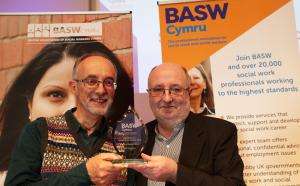Don't be afraid to show your fragility says award-winning social worker

Published by Professional Social Work magazine - 29 March 2019
Social workers need to show their own “fragility” if they are to work with people in a way that is “fully human”.
That was the message from Nick Andrews, winner of the spirit of social work category in BASW Cymru’s Social Work Awards 2019. A social worker for two decades, he says it’s important to acknowledge “we are all people on life’s journey” and should therefore show “solidarity” with people through their joys and sorrows.
“It is about compassion which means you are not immune to other people’s suffering or your own. You have to really identify with people, and be authentic, in what social work professor Felix Biestek called the ‘use of self’. I have often found that when I have shared my own vulnerability, it has brought out the best in others.”
Nick, who is a research practice development officer for Swansea University, cites an early lesson learned while working in a children’s home.
“There was one lad who had 12 foster care breakdowns and was really guarded. One day I was trying to fix a bike and making a bodge of it. He came and asked me what I was doing and said he had a book on repairing bikes. He went and got this book and helped me fix the bike. Our relationship totally changed after that day.”
Nick believes social work is all about relationships. He finds talk about “professionalising the workforce” unhelpful.
“That puts a barrier between people. It says ‘I am sorted and you are not’. That is not my idea of professionalism. It is about that solidarity first.”
Rather than promoting “evidence-based practice”, he prefers to refer to “evidence-enriched practice”.
“Evidence-enriched values and starts with people’s own reality and knowledge, not the researchers,” he says.
People will be more open to engage with research evidence when they feel their own knowledge - be it from practice or lived experience - is the starting place, adds Nick.
“You must always start with what they have got, not what they haven’t got."
Another term which has gained much currenctly in recent years that Nick dislikes is co-production.
“It sounds mechanistic and process-driven. We are talking about relationships, stories, dialogue – the stuff that brings people alive and brings the best out of them.”
Nick believes sharing stories is a key part of social work, both with service users and among professionals. He says story and dialogue-based approaches to learning should play a greater role in social work training and the development of services.
“You start with someone’s story and it generates interest and questions. We are working with people from Cambridge University’s Faculty of Education and others around dialogic ways of learning. It is a social pedagogy approach that gets lost in the systems we put around social work.
“In Wales we have legislation that puts importance on relational ways of working, but you need management support to work in this way. You also need approaches to regulation and training that promote creative, contextualised and kind practice, not compliance with standardised procedures or data management systems.”
Look out for more coverage of the BASW Cymru Social Work Awards in May's PSW magazine.
This article is published by Professional Social work magazine which provides a platform for a range of perspectives across the social work sector. It does not necessarily reflect the views of the British Association of Social Workers.
